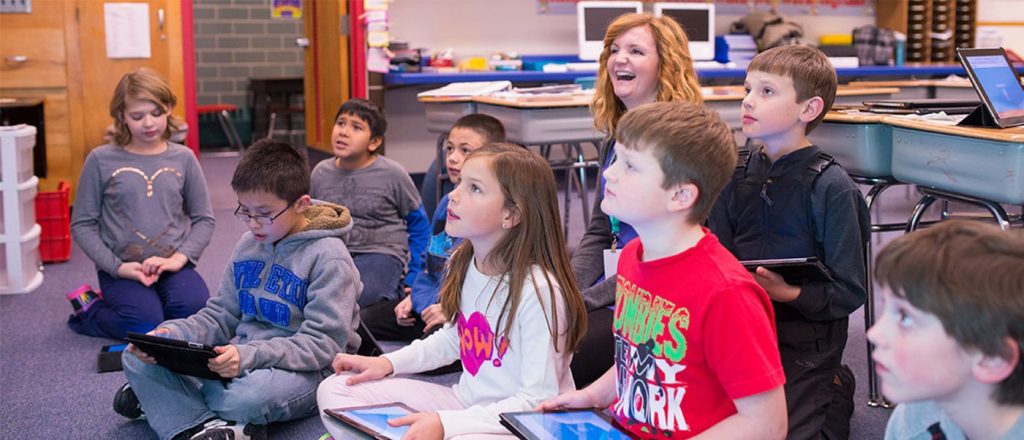Northwestern offers a lot of opportunities for students majoring in the field of education. However, a new opportunity is available specifically for students majoring in English as a Second Language (ESL) Education. It is called the ELM Project. The initiative was created as a resource for teachers who educate “English Learners in the Mainstream.” The ELM project is funded by the Bush Grant Foundation and a consortium university.
All teachers are required to serve their English learners well, but the ELM project has created opportunities for Northwestern’s ESL Education graduates to become trainers/coaches/specialists within their district or school to support the development of all teachers.
“It is really exciting that all schools and districts are engaging in this federally funded program meant to support English Learners in the midst of our current ESL teacher shortage,” said Jonell Pacyga, an adjunct instructor in Northwestern’s Department of Teacher Education.
Another opportunity unique for majors in ESL Education and Spanish Education is the creation of a dual-licensure program, which has become popular in recent years.
“Due to the overlaps within language teaching coursework, completing a B.A. with two licenses in K-12 Spanish Education and ESL Education is a dual-license track that many of our teacher candidates are choosing. These dual-licensure graduates are in high demand,” said Pacyga.
Students majoring in any education program can also now teach in another country along with Northwestern faculty.
“This year, several education students taught in Haiti on a summer trip and others will go to China this spring. Similar Teacher Education opportunities are planned in the future as well. Many of our ESL teacher candidates find these experiences very valuable, and it is so great that other program candidates can do this as well,” said Pacyga.
Education majors will also now be able to student teach abroad. This international student teaching opportunity is in partnership with Wheaton University, IL.
“Growing through experiences in many different cultural and linguistic contexts leads to more flexibility when language teachers are connecting with their future students, no matter where they are led to teach in the world,” said Pacyga.
Pacyga is a graduate of the ESL Education program at Northwestern herself and intended to teach overseas.
“I thought I was going to teach abroad following graduation, but instead the Lord led me to a special public high school right in our area that served recent immigrants and refugees who had never been to school before. With my team of talented colleagues, we would equip students from over 35 different language backgrounds to be college ready in 4-5 years with a 90% college enrollment and success rate. This experience set a foundation for me in knowing that the Lord can surprise you in beautiful and unexpected ways with the opportunities that He gives, and that our ESL program can be a tool that He uses to change the lives students from all backgrounds,” said Pacyga.
She believes that teaching is a calling because language teachers become a vibrant, life-giving bridge between cultures and people.
“The Lord is always at work! In ESL Education one often feels at the front line in service to some of the most vulnerable people on the planet, or to impact lives on a larger scale. When language educators serve recent immigrants and refugees, we often learn so much from them—as well as partner within communities to offer tangible support along the long road of acquiring another language,” said Pacyga.
She knows that many education majors struggle with the thought of living out their faith while also teaching in a secular environment. Many of the classrooms education majors will eventually teach in are filled with students from diverse backgrounds and various religions.
“As Christian educators, our calling is to be a reflection of the loving God that we know in Christ Jesus. As ESL educators, many of our students and their families come from backgrounds different than our own, including different belief systems and culture customs. I love that this is a perfect opportunity to let that difference or ‘light’ to shine! Of course, how much one can directly say or not say is different in every context. In some countries, our alums teach under extreme state-sponsored surveillance and what they can do looks a bit different than, say, our alums that teach in private Christian international programs or in classrooms in the United States. In the School of Education, our passion is to help our program graduates understand how their faith impacts their excellence in teaching and how it can shine through in any context,” said Pacyga.
For students who are considering majoring in ESL education, there are many options to consider. There are certificate programs, licensure programs, and advanced degrees.
“At Northwestern, we are very proud to be able to offer a program of the highest international standards so that you can teach anywhere in K-12 classrooms within the United States and anywhere in the world. This flexibility is an amazing tool that the Lord uses throughout the lives of our program alums in amazing ways. I always love to hear about their most recent opportunities and adventures,” said Pacyga.

